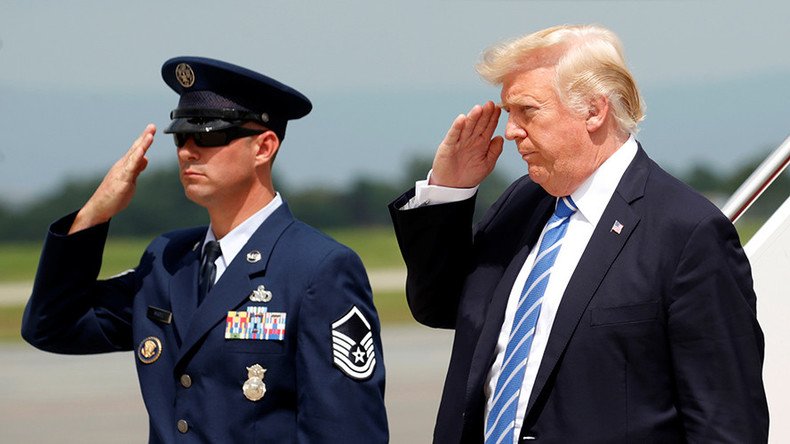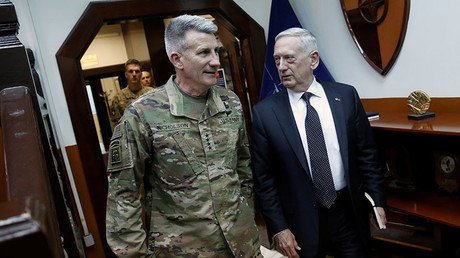Trump reviews military options for Afghanistan at Camp David, makes no decision

President Trump and his national security team failed once again to work out a new strategy on Afghanistan, which now risks becoming a “drug economy” despite the 16-year US occupation and $8.5bn spent on anti-narcotics programs.
Trump returned to his private golf course in Bedminster, New Jersey, on Friday after spending the day at the presidential retreat in Maryland, where White House Press Secretary Sarah Huckabee Sanders said he was “briefed extensively by his national security team on a new strategy to protect America's interests in South Asia.”
“The president is studying and considering his options and will make an announcement to the American people, to our allies and partners, and to the world at the appropriate time,” the White House said, according to Military.com.
Trump tweeted that he had a “GREAT meeting on National Security, the Border and the Military” on Friday.
Just returned to Bedminster, NJ from Camp David. GREAT meeting on National Security, the Border and the Military! #MAGA🇺🇸 pic.twitter.com/Hjmcnnse9j
— Donald J. Trump (@realDonaldTrump) August 18, 2017
No announcement was made on whether more troops would be committed to the region.
The president was joined by Vice President Mike Pence, Chief of Staff John Kelly, National Security Adviser HR McMaster, Secretary of State Rex Tillerson and Secretary of Defense James Mattis, among others.
Via pool reporter @anniekarni, the list of attendees at the Camp David National Security Council meeting today on Afghanistan. (1/2) pic.twitter.com/HYBXpGrVsF
— Olivier Knox (@OKnox) August 18, 2017
On Thursday, Mattis told reporters at the State Department that the Trump administration “will move this toward a decision” on Afghanistan during the retreat at Camp David.
“We are coming very close to a decision, and I anticipate it in the very near future,” Mattis said.
In June, Mattis confirmed that Trump granted him the authority to set troop levels in Afghanistan. However, without the president signing off on a full strategy, the defense secretary has not made any changes to troop levels.
Mattis has reportedly been considering a plan from General John Nicholson, commander of U.S Forces-Afghanistan, who said the US needs an additional 3,000-5,000 troops to be successful in the region.
According to the Congressional Research Service, there were 9,800 troops in Afghanistan at the end of 2016.
Nicholson was not among the president’s national security aides at Camp David Friday.
When asked Monday if Trump has confidence in Nicholson, Mattis told the press to "Ask the president.”
"I will tell you right now, he is our commander in the field, he has the confidence of NATO, he has the confidence of Afghanistan, he has the confidence of the United States,” Mattis said, according to the Washington Post.
The White House has also considered a plan from Erik Prince, founder of the private security firm formerly called Blackwater, who proposed outsourcing the job of training and assisting Afghan forces to private contractors.
Prince’s plan was presented to Mattis by Trump’s former chief strategist Steve Bannon.
Lawmakers have been growing increasingly frustrated with the Trump administration over the lack of direction in Afghanistan. Last week, Senator John McCain (R-Arizona), chairman of the Senate Armed Services Committee, unveiled his own “strategy for success,” which he plans to bring to a vote when the Senate returns in September.
Erik Prince suggests replacing US troops w/ private contractors on long-term basis https://t.co/If6aKHfOM0
— RT America (@RT_America) August 11, 2017
"Nearly seven months into President Trump's administration, we've had no strategy at all as conditions on the ground have steadily worsened," McCain said in a statement. "We are losing in Afghanistan and time is of the essence if we intend to turn the tide."
As Washington strategists float strategies on bringing the Afghan War to a decisive end, the country is struggling amid skyrocketing opium production, galloping inflation, and corruption.
Russia, one of the major security providers in Central Asia, has recently denounced the US presence in Afghanistan, saying the 16-year Western occupation has left the country at an impasse. “The volume of Afghan drug trafficking is not decreasing, while its geography has expanded, in particular, to African countries,” the Russian Foreign Ministry said in a recent statement.
US and NATO forces effectively failed “to provide effective assistance to the Afghan Government in curbing drug production, which is known to be a key source of terrorism financing,” it stated.
The ministry said it welcomed a recommendation by US Special Inspector General for Afghanistan Reconstruction John Sopko to develop a US anti-drug strategy in Afghanistan, adding, “Sopko’s report noting the $8.5 billion spent by Washington on the anti-drug campaign in Afghanistan points directly to its failure: drug production in Afghanistan is breaking records, and the country remains the world’s largest producer and exporter of opium.”













